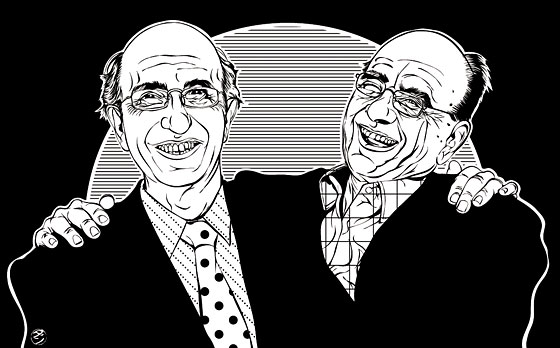
In the wake of last week’s shockeroo announcement that Joel Klein was stepping down as the city’s schools chancellor, much of the attention surrounding the move was focused on the job from which he was departing: on his controversial tenure; on the qualifications (or lack thereof) of his replacement, Cathleen Black; on the vast remaining challenges facing public education in New York. What received less ink, but may be more intriguing, is what the future holds for Klein—and what it means that Rupert Murdoch has decided to dive headlong into what his newest employee called “the education marketplace.”
Like Bloomberg’s stealthy courtship of Black, the canoodling between Murdoch and Klein that led to their conjoinment was highly sub rosa. In retrospect, there were incidents that might have been noticed by a sufficiently eagle-eyed sleuth: the two seated beside each other and chatting animatedly at a private screening of the education documentary The Lottery last summer at MoMA; Murdoch’s naming of Klein as the city’s most important person in these pages a few weeks ago. But as the deal inched closer to being sealed, both kept mum about it even to most of their closest confidants.
Klein, of course, is no stranger to either the media business or to Murdoch. Back in 2001 and 2002, during the interregnum between his stints as the Justice Department’s antitrust chief and schools chancellor, Klein served as chairman and CEO of the American operations of Bertelsmann AG. As for Murdoch, Klein points out to me that the News Corp. paterfamilias “has been a strong supporter of what we’re doing [in the city]. He made a huge contribution to the Leadership Academy”—one of the signal innovations of Klein’s time at Tweed Courthouse.
But Murdoch’s hiring of Klein suggests that the mogul’s interest in education is no longer merely passing or purely philanthropic. And this has caused no small degree of both befuddlement and conspiracy-mongering. In a blog post at NewYorker.com, Nicholas Lemann observed that two prominent Wall Street short sellers recently declared that they foresee a “a crash coming in the for-profit education sector”—a sector populated mainly by shady outfits peddling online college degrees. “What opportunity does Murdoch see in a sector that … already got bid up too high and is on its way down?” Lemann wondered. Meanwhile, over at the left-wing Firedoglake.com, one blogger (with a highly developed capacity for thoroughly baseless speculation) argued that “Murdoch wants Klein to manage a bunch of Fox-owned for-profit charter schools, which would extract state and federal dollars for corporate interests based on dubious records of student achievement.”
In fact, the likelihood that Murdoch’s education strategy will involve either charter schools or online college-diploma mills is very close to zero. Instead, it is all but certain to revolve around one of the most fertile areas of innovation today: the application of digital technology to learning. In the next few years, “what you’re going to see in educational software and new solutions and online learning is going to be game-changing,” says Klein, in terms of “the ability of new technology to both improve instruction and the quality of it through new learning platforms.”
Klein is no expert in this area, but in his time as chancellor, he became convinced of the need to move away from what he calls “this sort of twentieth-century model of one teacher trying to master all the content and information and deliver it to 25 children, who are performing at different levels.” In 2009, he launched the School of One, a pilot program using virtual tutors, online lessons, and real-time data to create a highly individualized model of instruction. He also became a big booster of Quest to Learn, a heralded new school in Chelsea that employs digital media and computer-game design to foster collaborative systems thinking.
Exactly how Klein’s burgeoning passion for this stuff will take shape inside News Corp. has yet to be hammered out. But he makes clear that he believes the “huge transformation in the field of education” that is coming is “going to be driven by private markets”—by a wave of digital-learning start-ups now swelling around the country. And that, whether through investments or acquisitions, Murdoch intends to ride this wave, ideally to the benefit of both the education system and News Corp.’s bottom line: “Otherwise, we wouldn’t have done this,” the outgoing chancellor says.
In addition to the pecuniary benefits of his shift from doing good to doing good by doing well, Klein will enjoy another perk in his new private-sector life: the absence of disgruntled parents and braying union bosses constantly pelting him with verbal tomatoes. “I won’t miss being called a jerk, that’s for sure,” he says.
Really? One of Klein’s greatest strengths as chancellor was his willingness to be disliked in the service of what he thought was best for kids—a thick-skinnedness that sometimes came across almost as a masochistic streak, to the point where it makes you wonder if he might actually miss the abuse.
“Well,” he says, “if you need to editorialize, you should feel free to do so.”
Have good intel? Send tips to [email protected].